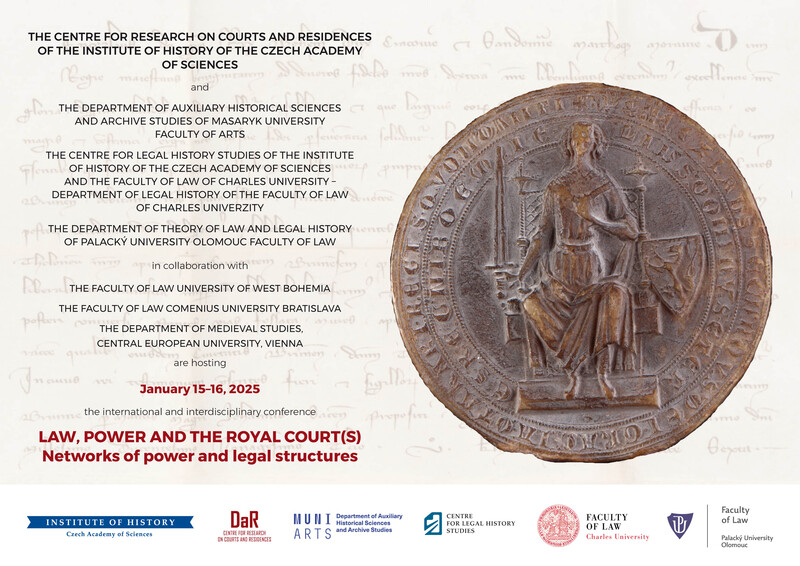Law, Power and the Royal Court(s). Networks of Power and Legal Structures
 15. 1. 2025 – 16. 1. 2025
15. 1. 2025 – 16. 1. 2025
 AKC Academic Conference Centre, Husova 4a, Prague 1
AKC Academic Conference Centre, Husova 4a, Prague 1 
The international conference Law, Power and the Royal Court(s). Networks of Power and Legal Structures is organised by the Centre for Research on Courts and Residences of the Institute of History of the Czech Academy of Sciences, the Department of Auxiliary Historical Sciences and Archive Studies of Masaryk University, Faculty of Arts, the Centre for Legal History Studies of the Institute of History of the Czech Academy of Sciences and the Faculty of Law of Charles University – Department of Legal History of the Faculty of Law of Charles University, the Department of Theory of Law and Legal History of Palacký University Olomouc, Faculty of Law, in collaboration with the Faculty of Law, University of West Bohemia, the Faculty of Law, Comenius University Bratislava, and the Department of Medieval Studies, Central European University, Vienna. It will take place from 15 to 16 January 2025 in a hybrid form at the Academic Conference Venue (Husova 4a, Prague 1) and via Zoom.
The court is a complex historical phenomenon of “long duration” which can be studied from various perspectives, and it also provides an opportunity for interdisciplinary collaboration between historians and jurists. So as to trace development trends and how they change, this international conference will cover a time span of centuries from the Middle Ages to the early modern period. The first subject area will be the court as a social space for exercising power and law. From this point of view, court society will be considered primarily as a collection of people structured and organised through legal and power relations in terms of rights and related expectations, and specifically hierarchical superiority and subordination. Unlike on the periphery, law and its practice within the court may be more open to observation. However, one must recognise, in retrospect, that extra-legal connections and contexts often played a role, too. In order to achieve a greater diversity that will allow us to formulate broader comparative conclusions, the conference programme shall not be limited to the rulers and those around them, but should also take reasonable account of the courts of the secular and spiritual elites. The second main area of interest shall be the important central, regional and local institutions personally and functionally linked to the feudal courts. These institutions both participated in legislation and jurisdiction and were also important nodal points in the flow of power and legal communication. Underlying the reflections on the conference theme is the insight of the eminent legal historian and medievalist, Van Caenegem, that legal rules are not so much a theoretical invention of jurists abstracting from reality and deriving standards from the principles of natural justice, but that rather they largely emerge as a result of conflicting interests and actions of influential groups at a certain moment after a point of equilibrium has been reached in society. It was these tensions that shaped the form of law in the past. These conclusions are confirmed by sociological approaches to law (e.g. Rudolf von Jhering). In a (legal) historical perspective, then, “law” and “power” need not represent two irreconcilable opposites, but they can rather be understood as mutually influencing social phenomena whose analysis in specific historical contexts and conflicts promises to bring scholarly benefits for historians and lawyers alike.
Based on the concept thus defined in the era of monarchy and on interdisciplinary focus, the international conference will address four core subject areas:
- the “anatomy” and (dis)continuity of official power
- the centre and periphery of governance
- gender in power and legal contexts
- the formal and informal ways and means of exercising power and law and their outcomes
Presentation duration: max. 25 minutes
Conference languages: German, English
We plan to publish the papers from the conference in the academic journal Mediaevalia Historica Bohemica, and this will involve a peer-review process.
Organisers:
JUDr. PhDr. Jakub Razim, Ph.D. et Ph.D.
doc. Mgr. Dalibor Havel, Ph.D.
doc. PhDr. Dana Dvořáčková-Malá, Ph.D.
PhDr. Jan Zelenka, Ph.D.
doc. JUDr. Jiří Šouša, Ph.D.
Guarantors: prof. PhDr. Lenka Bobková, CSc., prof. PhDr. Josef Žemlička, DrSc.,
prof. JUDr. Jan Kuklík, DrSc.
 15. 1. 2025 – 16. 1. 2025
15. 1. 2025 – 16. 1. 2025
 AKC Academic Conference Centre, Husova 4a, Prague 1
AKC Academic Conference Centre, Husova 4a, Prague 1 

